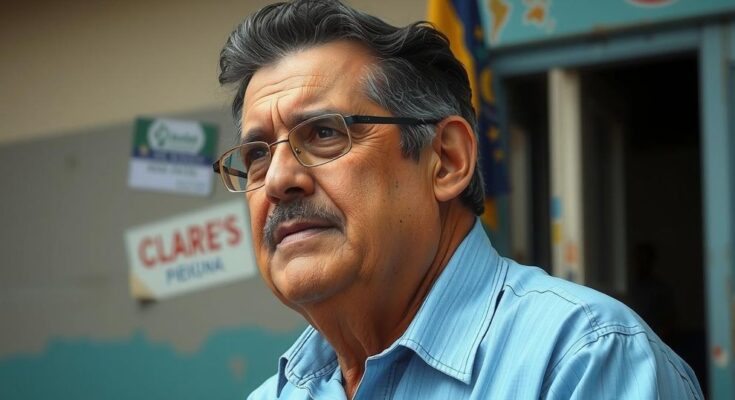Edmundo González, a self-exiled Venezuelan opposition leader, is rallying international support to assert his victory over Nicolás Maduro in the disputed July elections. In Panama, he presented what he claims are original electoral tally sheets and secured backing from various Latin American leaders. However, Maduro’s administration remains firmly in control, intensifying repression against dissenters as González prepares for a controversial return to Venezuela amidst a politically charged environment.
Edmundo González, the Venezuelan opposition leader currently in self-imposed exile, is intensifying his campaign for international recognition of his claim to victory over Nicolás Maduro in the contested presidential election held in July. On a visit to Panama, González presented alleged original electoral tally sheets purporting to demonstrate a decisive win. He was accompanied by former Latin American leaders and met with Panamanian President José Raúl Mulino to discuss his initiative. As González seeks further support, having already engaged with U.S. President Joe Biden and leaders in Argentina and Uruguay, he is faced with the challenge of asserting control amid Maduro’s entrenched regime.
The significance of this claim lies in its resonance with several nations in the region, despite opposition from Maduro’s administration, which has ordered González’s arrest. Following a meeting in Panama, where President Mulino affirmed his support for González, the latter’s diplomatic tour is seen as a critical moment in his attempt to reclaim power in Venezuela. However, despite the apparent support, González’s path remains fraught with difficulties, particularly following a recent escalation of repression from Maduro’s government against the opposition, as evidenced by the arrest of numerous activists and political opponents.
González’s actions have garnered notable attention, especially as Colombian President Gustavo Petro announced his refusal to attend Maduro’s upcoming inauguration, a significant shift given his previous amicable relations with the Venezuelan leader. This change in stance from Petro, coinciding with rising international concern over human rights abuses in Venezuela, lends weight to González’s narrative of widespread electoral fraud.
The opposition claims that the results of the disputed election would confirm González’s victory, as they allege the government suppressed legitimate opposition activity. Panama’s backing of González stems from its advocacy for electoral transparency and democratic processes, which has led to a complete severance of diplomatic relations with Maduro’s government.
As he prepares for a controversial return to Venezuela with plans to assert his presidency, González’s strategy remains unclear. With the specter of further confrontation looming, the political landscape in Venezuela is poised for heightened tensions, reflective of ongoing regional and international dynamics. Should González succeed in rallying sufficient support, it could pave the way for a renewed challenge to Maduro’s authority amid a deeply divided electorate.
In the tumultuous political landscape of Venezuela, the 2023 presidential election results have been a point of contention. Nicolás Maduro has been in power amid allegations of widespread electoral fraud and repression of dissent. Edmundo González, an opposition leader who claims that he rightfully won the July elections, has embarked on a diplomatic campaign to seek international recognition for his assumed presidency. His recent activities, especially his meetings with Latin American leaders and the U.S. President, indicate a strategic effort to consolidate support against the Maduro regime. The Venezuelan opposition continues to face significant hurdles, including government crackdowns that have resulted in the arrest of numerous activists and critics. The implications of González’s claims and the international response could critically influence Venezuela’s political future in a region already fraught with challenges.
The scenario surrounding Edmundo González’s attempts to reclaim the presidency in Venezuela signifies a critical junction in the country’s ongoing political crisis. With strong international support, particularly from regional leaders and countries like Panama, González’s challenges are not merely domestic but also reflect broader geopolitical dynamics. Nonetheless, the Maduro regime remains determined, having fortified its control over state institutions. The coming days will be crucial as González prepares for his controversial return amid rising tensions, raising questions about the future of democracy in Venezuela and the international community’s role in supporting opposition efforts.
Original Source: www.newsweek.com




